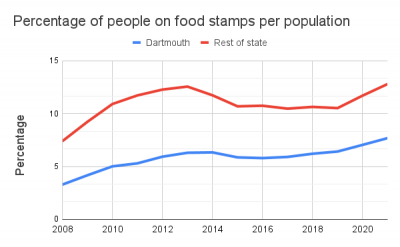Number of Dartmouth kids on food stamps up 11% so far this year
The average number of Dartmouth children under 18 participating in the state’s food stamp program jumped 11% in the first quarter of 2021, according to state data.
Numbers provided to Dartmouth Week by the Department of Transitional Assistance show that there are more than twice as many residents on food stamps now than in 2008 — and still nearly twice as many as in the post-crash economy of 2009.
More than 2,500 residents — and more than 600 children — were on the state’s Supplemental Nutrition Assistance Program (formerly food stamps) in each of the first three months of 2021.
An average of 2,612 people, including 684 minors, in Dartmouth participated in the program in the first quarter of this year.
The onset of the pandemic last year saw nearly 10% more residents in the program than in 2019 on average.
Dartmouth Youth Advocate Deloris Joseph said that while she hasn’t directly seen a rise in youths and families asking for help, she knows there is a need.
“There are a lot of entities in Dartmouth and surrounding areas providing for food insecurity,” she noted. “I know there is a need and I think that people have been savvy as far as how to meet that need without reaching out to me first.”
She said that during the pandemic, any child eligible for a free or reduced school lunch is automatically added to a family’s SNAP benefits.
The pandemic is seeing many programs help feed area families, including Dartmouth Public Schools, which give out free food boxes, as well as the YMCA, Massachusetts Military Support Foundation, the Council on Aging, and also religious organizations like the Smith Mills Church.
Joseph added that people are now able to use their benefit debit cards to get fresh produce at farmer’s markets.
“They get more for their money,” she noted. “That’s something that’s new and hopefully that helps out too!”
Data also show that the number of people on food benefits in Dartmouth — and in the rest of the state — never really recovered from the crash of 2008, a finding that Joseph called “not surprising at all.”
“There’s a misconception — when people say the economy was booming, that doesn't mean it was booming for everyone,” she noted.
Although Dartmouth’s numbers per population are less than in Massachusetts overall, with less drastic movements over time, the changes still track closely with what is going on statewide.
And — as in the rest of the commonwealth — the number of Dartmouth residents with earnings who are also on food stamps has more than doubled since 2008, with 251 in the first quarter of 2021.
“What we’re seeing is that people are not making enough money based on their family size to meet their needs,” Joseph explained, adding that underemployment has also gone up during the pandemic, with many businesses not bringing back staff full time.
A rise in mental health issues due to the stress and anxiety caused by the pandemic may also add to the problem, according to Joseph.
“If people are having severe mental health issues, they may not be able to go to work or to work as often,” she noted. “It’s just compounding these issues.”
Families looking for resources or help can visit the Youth Advocate’s page on the town website at town.dartmouth.ma.us/youth-advocate.

















